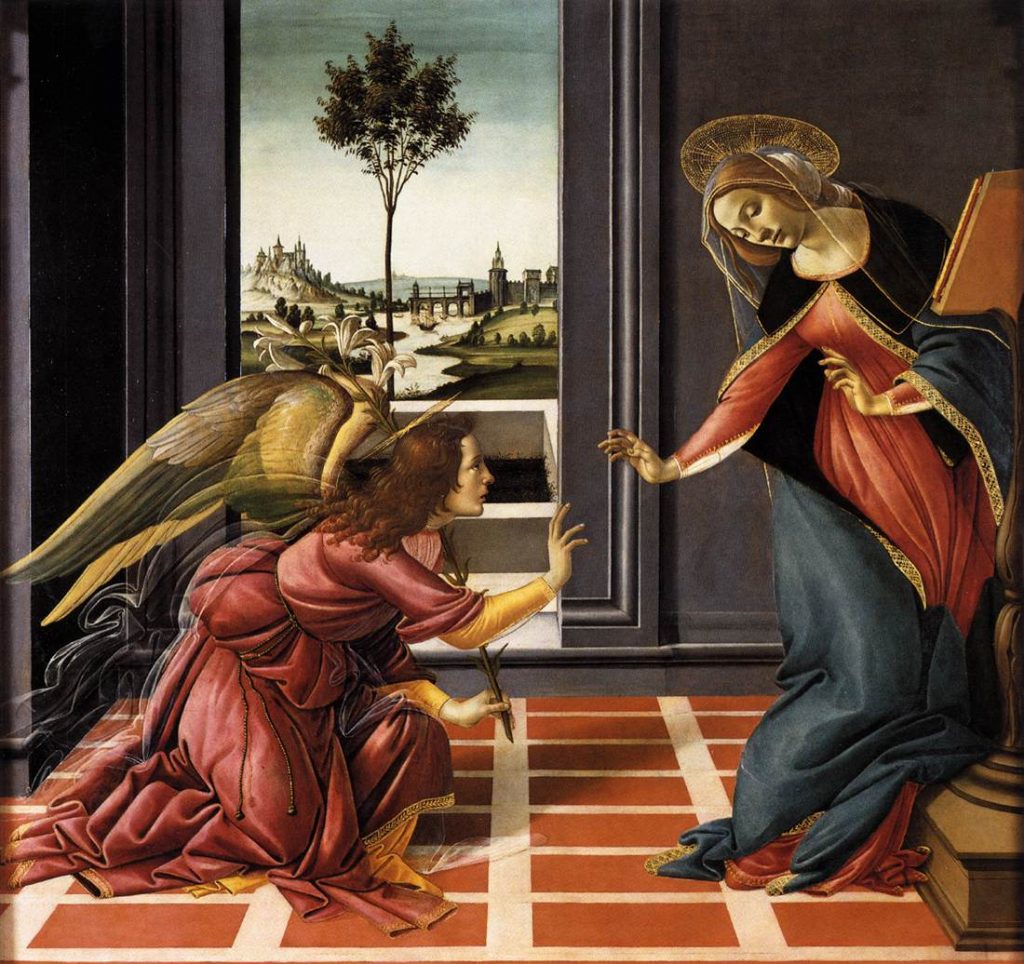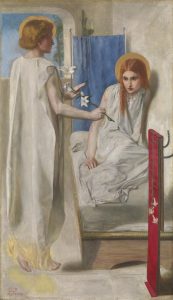
Botticelli
Sermon by Reverend Matt Harbage
Sunday December 20th 2020
Growing up in the Baptist Church, I only remember Mary being spoken of once a year. Only once. She would get a mention on Christmas Day, as the minister would declare: “Today we celebrate Jesus Christ (being born to Mary) – Jesus born today!”
I half-joke – but skipping too quickly over Mary, and her role in God’s amazing plan of redemption, misses out on many rich truths about God and insights about discipleship.
In a word, my message this Fourth and Final Sunday of Advent is a simple one:
Let us learn from Mary, and trust in God as she did.
As the dark nights draw in, our fears can grow. Like the shadows on the wall made by a flickering candle flame, our fears can jump about and fill our hearts.
FOMO – Fear Of Missing Out can be felt as we sit at home and wonder what our family and friends are doing.
Loneliness too, as the necessary self-isolation and social distancing take their toll.
Anger and resentment, bubbling in the background perhaps. Patience getting frayed.
Perhaps though, the biggest shadows which dart across the wall of our lives at the moment is the cycle of fear: fear of sickness, or of someone you love getting sick. The fear of death. The fear of being a silent carrier and passing the virus on to those closest to you.
With Brexit looming yet more fears are on the horizon.
And amongst our fears, we hear this story of humble little Mary of Nazareth being greeted by an angel.
During one of our Advent Art evenings, gathering together on Zoom, one of our group shared a painting from Dante Rossetti. The painting we were shown depicted a realistic imagining of this scene of Mary being greeted by the Angel Gabriel.
Realistic, honest and detailed depictions were things that made Rossetti famous in the mid-19th century as he helped to found the Pre Raphaelite style of painting.
And this depiction of the Annunciation (as it’s called) was no exception. Rossetti captures in Mary’s face and body so many of the emotions there in the Gospel text: Mary is almost backing away from the angel, as her face speaks of the uncertainty and let’s not be coy – the fear of the invitation the Angel was making.
To her fear, the angel speaks, ‘Do not be afraid, Mary, for you have found favour with God.’
An encounter with God spiritually, or in this case, an encounter with one of God’s messengers can be terrifying. God understands our fear, so it should be no surprise that the most common commandment in the Bible, is “Do not be afraid”.
For Mary, and for us today, we have legitimate fears. For Mary, being pregnant outside of marriage meant risking losing her fiancé Joseph, being shamed, disgraced, and being thrown out of her community. Even death.
In Mary’s interaction with the Angel, you can see her move from shock, to confusion, to comprehension, and finally to embracing. After all, the messenger is from God, and the invitation to bear a miracle, comes with the promise that she can trust in God, an invitation to the most exciting and meaningful journey of her young life.
That, I believe, is what God wants to offer each one of us as God calls us out of fear, and deeper into trust and discipleship. Let’s be honest, there are real risks to following God and obeying his calling – risks of uncertainty and sacrifice and it can be frustrating trying to listen to God in prayer, and making time to read and understand the Bible, and making time for Church and serving our brothers and sisters.
But it’s the most exciting and meaningful journey I’ve ever known.
The Advent Art group looked at a second painting of Mary and the Annunciation. Botticelli, in the 15th century, four hundred years before Rossetti, painted a masterpiece where the angel is on his knees, greeting and reaching out to Mary. Mary on the other hand has her body fleeing from the angel and she’s almost halfway out of the edge of the painting – and yet her hands and her head – are reaching back – back towards the angel in a posture of submission and of desire to connect. I can’t look at the painting without longing for the hand of the angel to touch the hand of Mary.
That desire for connection, for touch, is something I think we can all relate to in our COVID world. It’s also the desire I have in my prayer life; to touch God and be touched.
Mary is, once again, inviting us to imitate her by trusting in God [despite our fear].
As we continue the narrative for Mary, once she has given herself over to the idea that she was to be the mother of the Messiah, trusting in God, and putting Fear in its rightful place – she does not hide in her house, in shame or uncertainty, but hurries – runs to visit her cousin Elizabeth. And there, with her joy and trust in God being full to bursting breaks out in the words of the Magnificat:
“My soul Magnifies the Lord, my spirit rejoices in God my saviour!
For he has looked with favour on his lowly servant.”
Magnify – μεγα-λύ-νω – To make great, to increase, to extol, to amplify to enlarge – to reveal and declare the work of God within our own soul: That is the path of Christian discipleship!
The joyous miracle of Advent is that as we Magnify the Lord, like Mary we too are filled by God.
These last couple of weeks, I have seen marvellous things in our parish:
Teenagers, eager to have discussions about Jesus’ birth and to hear this mystery of God becoming flesh and being born as one of us.
Those in financial hardship leaving this building with smiles on their faces and bags full of food and supplies.
I have seen children laugh and sing with delight as they prepare for Christmas celebrations.
I have seen people explore our garden with wonder as the simple Christmas lights somehow shine a different kind of light and banish fear and shadows.
And just yesterday someone called me and said, “Thanks be to God. Praise be to God. God has done his wonder for me.” Echoing the very words of Mary.
So let’s join Mary in her devotion to God, her trust in God, and let’s magnify the Lord with her:
“the Almighty has done great things for me and holy is his name.”
Amen.

Ecce Ancilla Domini! (The Annunciation) 1849-50 Dante Gabriel Rossetti 1828-1882
Recent Comments